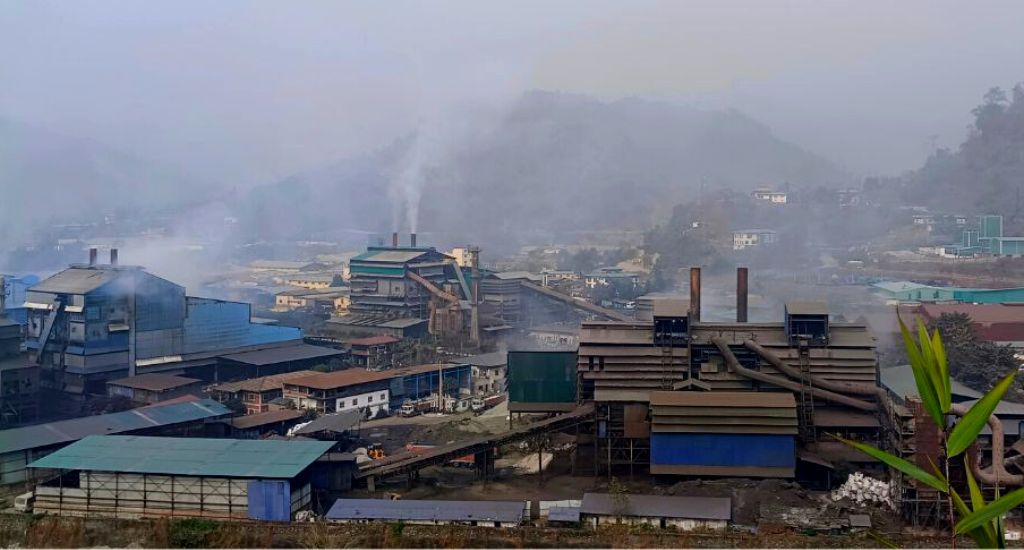
Bengal village gasps for air – blames Bhutan
Indian residents near a Bhutanese industrial township are suffering from respiratory and heart diseases, and even cancer, because of air and water pollution from the factories.

Indian residents near a Bhutanese industrial township are suffering from respiratory and heart diseases, and even cancer, because of air and water pollution from the factories.
Sita Subba contracted a fungal infection about five years ago on her right hand. It itches and burns a lot, so much so that she can’t sleep at night. She can’t help scratching her infected skin and it gets worse. Medication is not helping either.
The 67-year-old resident of Rangamati division, Central Dooars Tea Estate, in Alipurduar district lives close to the Bhutanese border. The heavily forested Himalayan kingdom’s industrial hub of Pasakha belches a steady flow of pollutants from smokestacks of its factories.
This doesn’t sit well with Sita in the neighbouring Dooars of North Bengal – the lower Himalayan hills dotted with tea plantations that produce the mood-lifting Darjeeling tea.
She isn’t the lone sufferer in these hills that the British Raj chose as a summer retreat because of its fresh air, lush greenery and cool climate.
People breathe soot-filled air now.

Nearly 5,000 people – mostly tea garden workers and their families – living in Rangamati, Basra, Hathimara and Pana divisions of the tea estate are facing health issues because of Pasakha, the industrial zone near Phuentsholing town in southern Bhutan.
Locals claimed that people are dying of cancer, heart diseases and other ailments because of the pollution.
“My wife died of cancer last year. Almost all households have family members suffering from some sort of ailments. White dust particles hang in the air, except in the monsoon. Our tin roofs have cracks because of the pollutants,” said Ashok Lama, 61, a retired tea garden worker.
The tea estate has a total area of 1,900 hectares with plantations on 1,235 hectares. It sits within a kilometre of Pasakha – which was built in 1988 and has over 20 large and small industries, including Bhutan Ferro Alloys and Bhutan Carbide and Chemicals Limited that were set up in the early 1990s.
Pasakha was chosen because it is close to the mines producing quartz, dolomite, limestone and the like for the factories, and is also a short distance from the border with India. It’s easier to import raw materials and export finished goods from this township.

Most of the products are shipped to India or Europe, bringing in much-needed forex to the Bhutanese economy.
Lying between Asian giants India and China, tiny Bhutan measures its success in “Gross National Happiness” and its constitution mandates a robust environment policy that says 60 per cent of its land must be under forest cover at all times. But it hasn’t made a net-zero pledge to join the club of carbon-neutral nations.
Bhutan’s happiness is not rubbing off on people on this side of the border. On the contrary, exposure to Pasakha’s factory-made air pollution is causing respiratory diseases like asthma and symptoms like coughing, wheezing and difficulty in breathing.
It seems that life might end in a second…but I have been living here for years, how can I relocate now?
Doctors have noticed growing cases of asthma and other respiratory ailments as well as fungal infection, heart diseases, and paralysis caused by poisonous air.
“We have written to the authorities, but nothing has been done yet,” said Dr Ajay Kumar Maharaj, senior medical officer of the tea garden.
Retired tea garden worker Arjun Lama, 65, is an asthmatic and doctors have advised him to shift elsewhere because the air pollution will only aggravate his fits.
“It seems that life might end in a second…but I have been living here for years, how can I relocate now?”
He said he lived in a serene environment surrounded by green trees and wild animals until the industries came up in the early 1990s.

“The environment was free of pollution. But that changed over the years. The biodiversity is gone. Animals have gone away from our jungles. There’s no fish in the Barsa river because of chemical wastes released by factories.”
“The Barsa’s water is making people sick from cholera and other vector-borne diseases,” said Bishnu Kumar Biswakarma, 58, a former supervisor at the tea estate.
Plantation officials claimed that tea production has come down drastically because of pollution, which is killing the tea bushes.
“The water used for irrigating the garden is contaminated…We used to produce 15 lakh metric tonnes of tea annually around eight years ago. This has dropped to 12 lakh metric tonnes,” said Amal Chandra Bora, the estate manager.
The officials had written to the state pollution control board, but to no effect. Cooch Behar-based non-profit Himalayan Nature Development Society had filed a suit in the Supreme Court in July 2019 against the pollution caused by Pasakha industrial estate.
The top court had issued notices to the Indian foreign ministry, the state government, the central and state pollution control boards, and the municipality of Alipurduar. It stands at that.
A team from a Kolkata-based non-profit found last April foul air shrouding the garden.
“The eyes start to smart, the throat itches, while nasal congestion is common. Trees and tea bushes have a dark coating on the windward side, as did roofs of houses. That’s soot,” said Naba Dutta, general secretary of Nagarik Mancha.
Bengal officials refused comments, saying it’s an international issue.
The lead image at the top shows the deadly smoke coming out from Pasakha industrial town in Bhutan (Photo by Gurvinder Singh)
Gurvinder Singh is a journalist based in Kolkata.